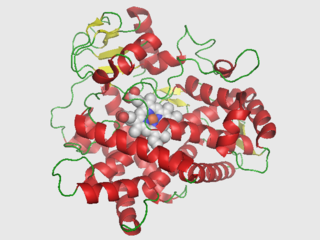
Allopurinol is a medication used to decrease high blood uric acid levels. It is specifically used to prevent gout, prevent specific types of kidney stones and for the high uric acid levels that can occur with chemotherapy. It is taken by mouth or injected into a vein.

Pharmacogenomics is the study of the role of the genome in drug response. Its name reflects its combining of pharmacology and genomics. Pharmacogenomics analyzes how the genetic makeup of an individual affects their response to drugs. It deals with the influence of acquired and inherited genetic variation on drug response in patients by correlating DNA mutations with pharmacokinetic, pharmacodynamic, and/or immunogenic endpoints.

Cytochrome P450 2D6 (CYP2D6) is an enzyme that in humans is encoded by the CYP2D6 gene. CYP2D6 is primarily expressed in the liver. It is also highly expressed in areas of the central nervous system, including the substantia nigra.
Toxicogenomics is a subdiscipline of pharmacology that deals with the collection, interpretation, and storage of information about gene and protein activity within a particular cell or tissue of an organism in response to exposure to toxic substances. Toxicogenomics combines toxicology with genomics or other high-throughput molecular profiling technologies such as transcriptomics, proteomics and metabolomics. Toxicogenomics endeavors to elucidate the molecular mechanisms evolved in the expression of toxicity, and to derive molecular expression patterns that predict toxicity or the genetic susceptibility to it.

Thiopurine methyltransferase or thiopurine S-methyltransferase (TPMT) is an enzyme that in humans is encoded by the TPMT gene. A pseudogene for this locus is located on chromosome 18q.

Cytochrome P450 family 2 subfamily C member 9 is an enzyme protein. The enzyme is involved in metabolism, by oxidation, of both xenobiotics, including drugs, and endogenous compounds, including fatty acids. In humans, the protein is encoded by the CYP2C9 gene. The gene is highly polymorphic, which affects the efficiency of the metabolism by the enzyme.

N-acetyltransferase (NAT) is an enzyme that catalyzes the transfer of acetyl groups from acetyl-CoA to arylamines, arylhydroxylamines and arylhydrazines. They have wide specificity for aromatic amines, particularly serotonin, and can also catalyze acetyl transfer between arylamines without CoA. N-acetyltransferases are cytosolic enzymes found in the liver and many tissues of most mammalian species, except the dog and fox, which cannot acetylate xenobiotics.

UDP-glucuronosyltransferase 1-1 also known as UGT-1A is an enzyme that in humans is encoded by the UGT1A1 gene.

UGT2B7 (UDP-Glucuronosyltransferase-2B7) is a phase II metabolism isoenzyme found to be active in the liver, kidneys, epithelial cells of the lower gastrointestinal tract and also has been reported in the brain. In humans, UDP-Glucuronosyltransferase-2B7 is encoded by the UGT2B7 gene.

Russ Biagio Altman is an American professor of bioengineering, genetics, medicine, and biomedical data science and past chairman of the bioengineering department at Stanford University.

Cytochrome P450 3A5 is a protein that in humans is encoded by the CYP3A5 gene.

The University of Florida College of Pharmacy is the pharmacy school of the University of Florida. The College of Pharmacy was founded in 1923 and is located on the university's Gainesville, Florida main campus. The college offers the entry-level Doctor of Pharmacy (Pharm.D.) degree as the first professional degree for students entering the profession. The college offered a Working Professional Pharm.D. (WPPD) program for bachelor's-trained pharmacists already in practice with its last cohort of students enrolled in 2016. Additionally, various graduate degrees are offered. The professional program is fully accredited by the American Council on Pharmaceutical Education. Since 2011 the college has been offering online degree programs at the graduate level, such as the Forensic Science Program, Pharmaceutical Chemistry Program and Clinical Toxicology Program. In total the College of Pharmacy received over $32 million in total Research Revenues in 2021.
The Pharmacogenomics Knowledgebase (PharmGKB) is a publicly available, online knowledge base responsible for the aggregation, curation, integration and dissemination of knowledge regarding the impact of human genetic variation on drug response. It is funded by the National Institutes of Health (NIH) National Institute of General Medical Sciences (NIGMS), and is a partner of the NIH Pharmacogenomics Research Network (PGRN). It has been managed at Stanford University since its inception in 2000.

Cancer pharmacogenomics is the study of how variances in the genome influences an individual’s response to different cancer drug treatments. It is a subset of the broader field of pharmacogenomics, which is the area of study aimed at understanding how genetic variants influence drug efficacy and toxicity.
Pharmacogene Variation Consortium is an international group of experts that maintains a systematic nomenclature system for allelic variations of genes that affect the metabolism of drugs.
Howard L. McLeod is an American pharmacogeneticist and implementation scientist specialized in precision medicine.

N-Desmethyltamoxifen is a major metabolite of tamoxifen, a selective estrogen receptor modulator (SERM). N-Desmethyltamoxifen is further metabolized into endoxifen (4-hydroxy-N-desmethyltamoxifen), which is thought to be the major active form of tamoxifen in the body. In one study, N-desmethyltamoxifen had an affinity for the estrogen receptor of 2.4% relative to estradiol. For comparison, tamoxifen, endoxifen, and afimoxifene (4-hydroxytamoxifen) had relative binding affinities of 2.8%, 181%, and 181%, respectively.

Mary Violet Relling is an American pharmacogeneticist. Relling's research focuses on pharmacokinetics and pharmacodynamics in children and how genome variability influences a child's response to cancer chemotherapy.
Teri E. Klein is an American professor of Biomedical Data Science and Medicine at Stanford University. She is known for her work on pharmacogenomics and computational biology.














